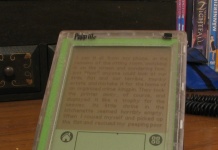 A while ago, I reported on Palm putting itself up for sale. It was uncertain whether it would find a buyer—several companies including HTC and Lenovo reportedly considered it but decided “no sale”—but today the announcement came that Hewlett-Packard is slapping down $1.2 billion to take Palm home.
A while ago, I reported on Palm putting itself up for sale. It was uncertain whether it would find a buyer—several companies including HTC and Lenovo reportedly considered it but decided “no sale”—but today the announcement came that Hewlett-Packard is slapping down $1.2 billion to take Palm home.
There are stories about this all over the place. A couple of the more interesting ones: TechCrunch’s MG Siegler talks with HP VP Brian Humphries about HP’s plans for Palm.
I asked Humphries to expand a bit about webOS and how it stacks up to rival mobile OSes made by Apple and Google. I also asked why HP wouldn’t just develop its own mobile OS as Apple has done? “We think it’s one of the best operating systems out there today. We see nothing in development in the next 3 to 5 years that comes close,” Humphries said. “We want to take HP’s financial strength and use it to take webOS to the next level,” he continued.
Siegler notes that HP is also acquiring a portfolio of over 1,500 handheld technology patents—useful in the “mutual assured obstruction” strategy that is key to competing in just about any high-technology field today. Humphries suggests that HP was more interested in Palm’s webOS than its hardware—which makes sense given that HP already has some pretty decent hardware of its own.
Also, Gizmodo has some analysis of what the acquisition might mean in the long term, pointing out the possible difficulties in reconciling Palm’s innovative and HP’s more overall conservative brand strategies and the way that HP has not always done well in the handheld market so far. Also, HP is an official Microsoft Windows Phone 7 partner, which means that its approach to handheld devices might end up being a tad schizophrenic.
Still, with HP’s hardware and Palm’s OS, this might be a match made in heaven. Whether “Hewlett Palm” can actually compete with the unstoppable behemoth that is Apple right now is unclear, but I suppose they’ve got a chance if anybody does.

































HP’s ties to MS shouldn’t be much of an issue simply because Palm also had ties to MS. Plus HP wants to play in both the corporate arena, where the Windows ties come in handy, and in the consumer arena, where the Palm name will be of use.
Shouldn’t be hard to say: “iPaq is our corporate line and Palm is our consumer line.”
Plus, lets face it, WebOS is a long shot to survive, to say nothing of prospering.
What shouldn’t be underestimated is the patent portfolio. It puts HP on the same general plane as APPLE, MS, Nokia and clearly above most of Google’s Android partners–except Motorola–who *don’t* have handheld/telephony patents to cross-license as a counter to claims from those that do.
(As witness HTC paying MS royalties on their Android phones.)
Android’s primary virtue is its price, but if using Android as a smartphone/gadget OS starts incurring royalties to MS, Nokia, Apple, and HP…
Things should get really interesting by this time next year once HP starts executing whatever their plans are for WebOS, WinMo7 is fully deployed, and Apple ships multitasking product. I expect serious pressure on Nokia and blowback on Android cause the market isn’t likely to support 5 different mobile platforms.
I hope that Palm survives the HP overlordship. We need competition, as much as we can get.
With WebOS based off Linux, though, I wonder if HP is going to get some calls from Microsoft Patent Portfolio lawyers? HTC just agreed to send MSFT some blood money, following Amazon’s lead. And HP’s involvement with Linux goes well beyond WebOS, of course.
Something makes me feel that HP will be dropping its Windows Phone devices, and minimizing its TabletPC lineup. And Microsoft can’t be pleased to contemplate that possibility.
— asotir
HP doesn’t need patent protection: they’ve long had a cross-license deal with MS and they just bought a fairly deep portfolio (Palm’s) to protect them from the cellphone makers.
The key thing moving forward is that we’ll soon find out if Palm’s underperformance over the past two years was due to lack of resources or lack of capability.